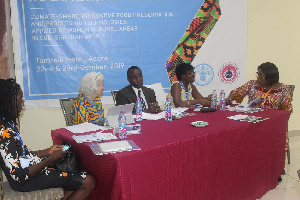- Home - News
- Polls
- Year In Review
- News Archive
- Crime & Punishment
- Politics
- Regional
- Editorial
- Health
- Ghanaians Abroad
- Tabloid
- Africa
- Religion
- Election 2020
- Coronavirus
- Photo Archives
- News Headlines
- Press Release
General News of Wednesday, 23 October 2019
Source: ghananewsagency.org
Regional workshop on agriculture technologies opens
A two-day regional workshop to identify innovative and practical climate-smart technologies applied by women in rural areas is underway in Accra.
The workshop brings together professionals in the agricultural value-chain to exchange ideas and experiences on innovative ways to mitigate the devastating effects of climate change on food systems in Sub-Sahara Africa.
The event is on the theme: “Climate-Smart, Innovative Food Preservation and Processing Technologies Applied by Women in Rural Areas in Sub-Sahara Africa”.
It was organized by the Centre for Scientific and Industrial Research (CSIR) and the Food and Agriculture Organization (FAO).
A speech read on behalf of Professor Kwabena Frimpong-Boateng, the Minister of Environment, Science, Technology and Innovation, at the opening of the workshop recognized the effects of climate change on agriculture production.
The Minister noted that climate change and its impact on sustainable developments had now taken centre stage of several discussions on the world’s developmental agenda, saying there was the need for a concerted effort to address the menace.
“The sudden changing weather patterns, rising sea levels and greenhouse gas emissions are current increasing evidence of Climate change, affecting the availability of basic necessities like fresh and potable water, food security and energy across the globe,” he added.
Prof Frimpong-Boateng said climate change did not only affect agricultural systems and food security, but also affected food processing mainly dominated by women.
He stressed that, the role of women in rural food processing cannot be underestimated, because of the critical interventions they made in rural poverty alleviation and empowerment for sustainable development.
Prof Frimpong-Boateng was hopeful that the workshop would contribute to harnessing ideas for the strategies needed for tackling some of the myriads of technological and developmental challenges related to sustained food preservation and processing by rural women.
Professor Mary Obodai, Director, CSIR in charge of Food Research Institute, said food processing operations were a significant source of waste generation, which constituted a major user of energy and a contributor to greenhouse emissions.
She stated that reducing the emission intensity of food processing operations and enhancing its resource efficiency, necessitated the use of climate-smart technologies, which helped to minimize waste generation.
Prof Obodai said over 90 per cent of women are into agro-processing, and that there was the need for African governments to provide the needed technical support to them to increase production and ensure food security.
Madam Jocelyn Brown Hall, the FAO Deputy Regional Representative for Africa, called for a multi-disciplinary approach to address climate change in Sub-Sahara Africa for sustained economic development.
She said FAO would continue to support agriculture initiatives in Africa especially rural women to alleviate them from poverty and help improve on their livelihoods.
Dr Rose Omari, Senior Research Scientist, CSIR in charge of Science and Technology Policy Research Institute, said Ghana had developed technologies over the years to improve food processing and safety.
She called for the need to improve the extension system to facilitate access to the application of these technologies by rural women.
Entertainment










